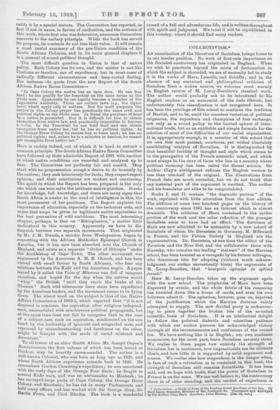COLLECTIVISM.*
AN examination of the literature of Socialism brings home to us our insular position. No work of first-rate importance on the Socialist controversy has originated in England. When we wish to penetrate beyond the mists of declamation in which the subject is shrouded, we are of necessity led to study it in the works of Marx, Lassalle, and &Algae ; and in the absence of any sustained and philosophical criticism of Socialism from a native source, we welcome most warmly an English version of M. Leroy-Beaulieu's classical work. The author would probably ask to be introduced to his English readers as an economist of the &Iola libirate, but unfortunately this classification is not recognised here. It has been the privilege of this school to continue the tradition of Bastiat, and to be, amid the ceaseless variation of political exigencies, the expositors and champions of free exchange, not only as a sound policy in the limited sphere of inter- national trade, but as an equitable and simple formula for the solution of most of the difficulties of our social organisation. It ix, appropriately enough, to a member of this school that we owe this most patient, courteous, yet withal absolutely annihilating analysis of Socialism. It is distinguished by that beautiful lucidity of thought and style which seems to be the prerogative of the French scientific mind, and which must always be the envy of those who live in a country where political economy has been called the dismal science. Sir Arthur Clay's abridgment reduces the English version to less than one-half of the original. The illustrations from French data are much curtailed, but we do not think that any material part of the argument is omitted. The author and his translator are alike to be congratulated.
Boots I. and II. contain "the dogmatic portion" of the work, reprinted with little alteration from the first edition. The addition of some two hundred pages on the history of the controversy since 1895 has an interest which is almost dramatic. The criticism of Marx contained in the earlier portion of the work and the sober reflection of the younger Socialists seem to have had an effect. The doctrines of Marx are now admitted to be untenable by a new school of Socialists of whom Dr. Bernstein in Germany, M. Millerand in France, and the Fabian Society in England are the representatives. Dr. Bernstein, at one time the editor of the romans and the Neue Zeit, and the collaborator there with Kautsky, who remains the leading " stalwart" of the Marxian school, has been taunted as a renegade by his former colleague, who denounces him for adopting (without much acknow- ledgment, our author sarcastically hints) the arguments of M. Leroy-Beaulieu, that "bourgeois optimist in optima, fornui."
Here M. Leroy-Beaulieu takes up the argument again with the new school. The prophecies of Marx have been disproved by events, and the whole fabric of his reasoning has tumbled down like a house of cards, and even his own followers admit it. The agitation, however, goes on, deprived of the justification which the Marxian doctrine vainly attempted to supply. The now divided party is endeavour. ing to piece together the broken bits of the so-called scientific basis of Sooialism. It is an intellectual delight to follow the polished dialectic and relentless patience with which onr author pursues his acknowledged victory through all the inconsistencies and confusions of the routed foe. We have nothing like it in English ; our own academic economists, for the most part, leave Socialism severely alone. We realise in these pages how entirely the strength of Socialism lies in sentiment, how impracticable are its ultimate ideals, and how little it is supported by solid argument and reason. We realise also how stupendous is the danger when, in face of such a refutation as is contained in this book, the strength of Socialism still remains formidable. It has been said, and we hope with truth, that the power of Socialism in France is on the wane. We can well believe it; the controversy there is of older standing, and the verdict of experience is * Collectitdont t a Study of Some of the Leading Social Quostions of the Day. By Paul Lore Beaulieu Member of the Institute, 6e. Translated and Abridged by Sir Arthur Clay, Bart, London: John Murray, [We 6d, net.]
being given that, fortunately or unfortunately, the thing is impossible, and that we must rest content with such progress as can be 'made on our present inevitable basis. Marx denied the possibility of such progress, and based his whole case on this assertion. His successors admit the progress, but continue the agitation. It is for the adherents of the ecole liberate to explain, to 'justify, and to quicken the salutary influence of exchange as an ingredient in the cement which holds civilisation together. Most warmly do we com- mend this admirable work to the study of all who seek' to understand the development of a controversy which in our own country has only just begun.










































 Previous page
Previous page